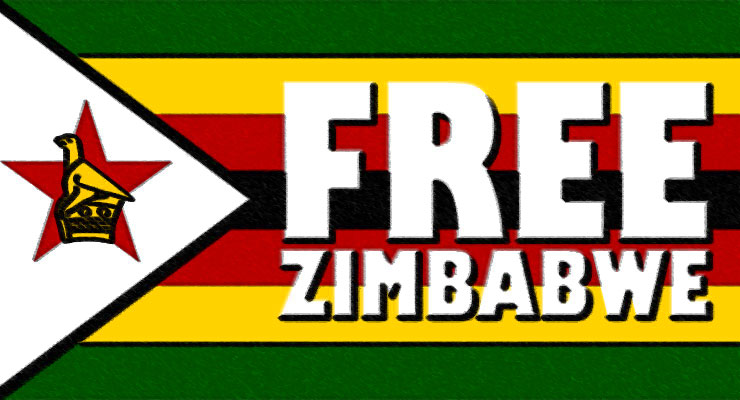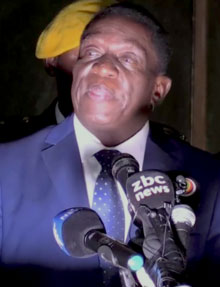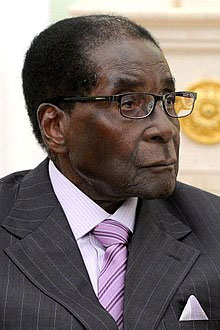
In multiparty democracies, a single party should not set the agenda. Zimbabwe’s ruling ZANU-PF want us to believe it should. No doubt then, that the announcement of the formation of the New Patriotic Front (NPF) by the remnants of Generation 40 (G40) has rattled the plans of Zimbabwe’s new President Emmerson Mnangagwa who himself is in a crisis of legitimacy after coming to power through a coup last November.

G40 and Lacoste were the two factions in the succession debacle within the ruling ZANU-PF before the coup, with the so-called Lacoste faction backing Mnangagwa. G40 was aligned to former president Robert Mugabe, ruler of Zimbabwe for the last four decades, who was allegedly angling for his wife Grace to succeed him. In short, G40 was against the ascendancy of Mnangagwa to replace Robert Mugabe.
Whether or not the country is turning away from authoritarian democracy is still to be seen. Arguably the planned harmonized elections in July/August will set the track for Zimbabwe’s medium-term political future. A decisive factor will be how the fractured opposition of 116 political parties will organize themselves ahead of the general elections. It is within this environment that the new party was founded.
The newly founded NPF is lead by retired Brigadier-General Ambrose Mutinhiri who had resigned two weeks ago from both ZANU-PF and his parliament seat. Mutinhiri last week met former president Robert Mugabe who gave his public blessings for the new party but advised that the elders should be in a position to groom young people to eventually take over the reins of the new party.
The next few months are sure to witness a robust public debates and election campaigns uncommon in Zimbabwe. Despite fierce competition from the longtime opposition MDC-T party, the ruling ZANU-PF has managed to cling to power since independence. The events of the last few weeks show that ZANU-PF feels threatened by the regrouping of G40 members. President Mnangangwa, during a ZANU-PF Politburo meeting last Wednesday, said that his government is watching Mugabe’s actions to determine whether they are aimed at destabilizing the nation.
For those not familiar with Zimbabwean politics, this might be difficult to understand. What ZANU-PF under Mnangangwa is failing to understand is that in multiparty democracies, a single party is not expected to set the agenda. What Mugabe has done is to associate with a political party of his choice which is his constitutional right. Section 58 of the Zimbabwean Constitution guarantees freedom of assembly and association.

Unfortunately, Mutinhiri has not been spared the wrath of the ruling party. His moves to create a new party are now being condemned as unprecedented by his critics from the state media, and praised as historic by his supporters.
So what should ZANU-PF actually do about the situation that they now face? What options are on the table for the new party to grow? The most obvious, and democratic, response from ZANU-PF would be to stop focusing on other party’s politics and ready itself for the upcoming general elections. The NPF, on the other hand, as a new party could easily ratchet up the intensity of their campaign against ZANU-PF by framing ZANU-PF as hostile to the democratic tenets of a multiparty system. ZANU-PF may then change the tenor of their current criticism of Mugabe and Mutinhiri and focus instead on bread and butter issues that win the votes.
The great threat now is that, as a former liberation movement in political power since independence, Mnangangwa’s ZANU-PF decides to reestablish an authoritarian regime reminiscent of the Mugabe era where dissenting voices are muted. With almost 38 years of governance, ZANU-PF is still dominated and controlled by the liberation struggle’s leadership even with Mnangangwa as its leader instead of Mugabe.
There is also widespread disappointment over the nearly four decades of rule by ZANU-PF especially among the youth. According to the Zimbabwe Election Commission (ZEC) a frustrated younger generation makes up 40 percent of the more than 5.3 million registered voters. Those between 18-40 years may very well challenge the status quo of the party during the upcoming national elections.
Worse, ZANU-PF inner-party structures are not accommodating to young people with the Youth League Chairman being the 52-year-old Pupurai Togarepi – who does not seem to want to go relinquish the post any time soon.
The new ZANU-PF has to live with the consequences of the end of the Mugabe era. In any fair elections, they should expect a split vote due to a healthy mix of protest votes and apathy. Mugabe having had total power for 37 years has created a chain of loyalties across Zimbabwe, many of whom are keen to vote for a project he is part of or supports. At the same time, there is no way ZANU-PF can expect loyalty from Mugabe after the humiliating dismissal he went through in the last year. Mugabe can as well say, as former United State President Ronald Reagan said after joining the Republican Party: “I didn’t leave the Democratic Party. The party left me.” Yes, ZANU-PF left Mugabe and, as part of the democratization of Zimbabwe, he should be free to join or form a new political party in accordance with the Zimbabwean Constitution.
Leave a Reply